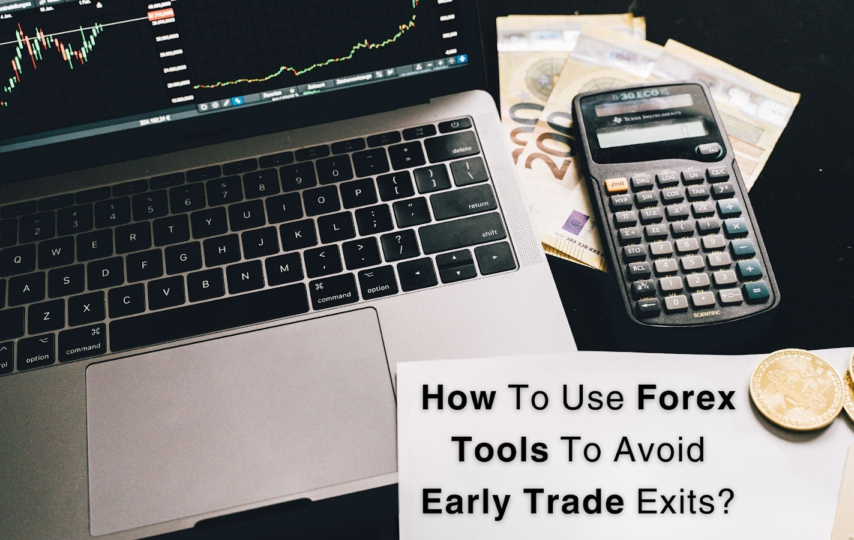Your profitability and success as a forex trader depends on a number of aspects. This includes your market knowledge, analytical skills, ability to think rationally and devise a sound strategy while following a disciplined approach to stay consistent with it. However, one thing newbies tend to overlook while paying attention to all these aspects is timing. Your timing in the forex market is just as important for success. The time at which you enter and exit the trades will determine your result in the end. Failing to exit a trade at the right time is like failing to use the opportunity you have. But exiting a trade way too early will also affect your performance as a trader.
Today, I will tell you about the psychology behind early trade exits and the tools you can use to avoid early exits in trading because doing things at the right time is important to make the most out of a trading opportunity.
Why Do You Want to Exit Trades Too Early?
To solve any problem, we need to start by identifying the root cause. In case of avoiding early trade exits, we need to understand the psychology behind this. The early trade exit results from a psychological pitfall in most cases. Our intention behind initiating a trade is to make profits, and we expect to earn some money while closing the position. So, when we have this fear of losing more by keeping the trade open, we will feel pressured to get out of that trade as fast as possible, even if there is a chance for getting better results by waiting.
This can happen in the case of a winning trade as well as a losing trade. We win a trade and close it as soon as we get some profits as we are afraid of losing these profits if the trend reverses later on. In case of losing trade, we feel like this will not work out and exit it right away, even when a definite stop loss is placed. Placing a very tight stop loss can also lead to early exits. Some traders don’t have enough patience to let the trades run and end up closing them just to get rid of the anxiety or stress they feel while holding onto a position.
This is why we need to focus on planning before taking any action. Those who don’t have a solid trading plan are more prone to early trade exits. You need to be sure about your profit targets and potential losses before entering a trade, and this will stop you from making sudden decisions under the influence of emotions. Tools like forex trading calculators are designed for calculating various trade-related metrics with precision and estimating possible trade outcomes in advance. Planning things ahead makes you feel less tempted to close a trade early as you are quite certain about the result in any situation.
Learn what leads to Early Trade Exits
- Absence of Trading Psychology
As I said earlier, the early trade exits can be attributed to psychological pitfalls in most cases. This happens because you don’t know much about trading psychology and don’t have control over your own emotions. Those with enough knowledge about trading psychology will be better prepared to deal with the intense emotions evoked during a trade. They will also experience fear, stress, anxiety and more while trading, but they won’t give in to their urges that easily. In short, the absence of trading psychology stops us from prioritising logic and reasoning. This makes us impulsive, and we end up exiting our trades way too early.
- Being sceptical
Another reason for early trade exit is being sceptical or doubtful about the outcome. Suppose the market is moving in your favour, and you are seeing some profits, but you are not sure about reaching your profit target yet and end up closing the trade. You think something is better than nothing, even if you lack faith in your strategy or calculations. Being sceptical is good to a certain extent, but not to the point that we limit our growth. Traders who are sceptical and pessimistic are more prone to early trade exits than assertive and optimistic ones.
- Lack of Market Knowledge and experience
Those who are lacking in knowledge and skills are more likely to take action based on their intuitions and guesswork. Experienced traders will already know about the price movements and trend shifts. Hence, they will not panic when they witness a sudden pullback or retracement in the trend. They know these are temporary and won’t exit the trade because of such brief reversals. However, traders who lack market knowledge often jump to conclusions and exit the trades as they misinterpret the situation.
Avoiding early trade exits – Importance of learning
One thing that can help you to avoid early trade exits is gaining knowledge about the market and technicalities of trading. As a beginner, you must indulge in learning and understand all the basic concepts clearly. For instance, you cannot make any progress if you are unsure about currency conversions and how these rates are applied in forex trading. Basic tools like currency calculators can help you figure out the price of one currency in another easily. In short, when you are well-versed in the basic and advanced theories, you will be able to make informed decisions, and this stops you from making trading mistakes.
Common trade scenarios in which we exit the trade early
- Trying to exit at a profit
The first type of trade scenario where we tend to exit the trades early is when we have a winning trade which has the potential to gain more, but we end up closing it way too early as we just want to take our profits right away. They fear that they will lose the profits that they have made and will prefer to exit at a profit, even if it is not much. By doing so we will be limiting our profit potential, which will stop us from maintaining our risk/reward ratio.
- Trying to minimise losses
Sometimes, we will see that the market is moving against us in a trade and will decide to exit it even before it hits our stop loss level. Sometimes, traders will see a pullback in the chart and think of it as a trend reversal. We just want to minimise the loss. In this case, we may end up closing trades that have the potential to win if we choose to wait some more time.
How can trading tools help you to avoid early trade exits?
- Pip calculator – The Pip calculator is a basic tool that helps you determine pips’ monetary value. All currency price movements are measured in pips, the standard measurement unit in forex. Professional traders always consider pip value and pip movements while planning and executing their trades. For instance, you can decide to set your stop loss at 20 pips away from the entry price and let the trade run freely. Avoiding early exits is all about having a definite plan and sticking to it. If your plan is not good enough, you might deviate from it in the middle of the trade. Trading tools like pip calculators are important for adding more precision to your plan, and this stops you from making poor trading decisions.
- Profit calculator – A profit calculator is a commonly used trading tool for calculating potential gains or losses of a trade. Knowing the results in advance allows you to plan it better by adjusting the Stop Loss and Take Profit levels. One of the key reasons behind early trade exits is the uncertainty associated with the results. This makes us anxious and restless while trading, leading to early trade exits. But when you use a profit calculator, you already know the amount of profits or losses you can make. You can use these metrics for managing the risk, and this will reduce your stress and anxiety while trading. Calm and composed traders are less likely to exit a trade early, and knowing the results in advance can help you remain firm during the trading process.
Conclusion
In a nutshell, early trade exits can make us feel like we saved our profits or we are minimising the losses for a while, but in reality, we are just feeding our fear, which is a major problem in trading. Being a forex trader, you should be able to embrace the losses once in a while. So, learn to accept them and deal with them when they happen.








